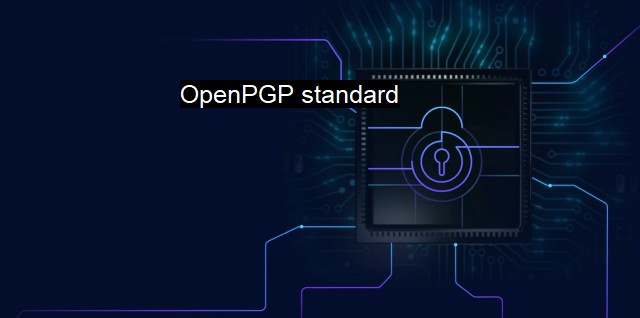What is OpenPGP standard?
OpenPGP: The Revolutionary Encryption Protocol for Secure Transmission of Sensitive Data
OpenPGP is an open-source cybersecurity standard used by various organizations and individuals for encryption and decryption, and digital signing of data. This cybersecurity standard utilizes public key cryptography, data compression, hash functions, and digital signatures in ensuring effective data protection. OpenPGP, short for Open Pretty Good Privacy, carries a greater sense of security assurance due to its open-source nature that allows peer verification and validation.OpenPGP is often used for encryption, decryption, and digital signature verification of both files and emails. When used to encrypt an email or file, the recipient is able to ensure that the content is securely locked by the sender's private key and hence, can only be decrypted by the recipient. This capacity for secure encryption and decryption strengthens data sharing security and eliminates the chance of interception especially when sensitive data is being shared across unsecure platforms.
In terms of the antivirus context, OpenPGP is an essential technology that provides an additional layer of protection against cyber threats. Many antivirus applications incorporate OpenPGP to protect, not just the communication stream, but the entire data infrastructure of an organization. The OpenPGP not only ensures immunity against malicious activities by the third parties, it also provides a sense of authenticity by validating the source and ensuring the data originates from a credible source.
The commonly known applications of OpenPGP include symmetric encryption, public-key encryption and digital signatures. Symmetric encryption, also known as private-key encryption, secures communication based on the same key for both encryption and decryption. Public-key encryption, on the other hand, includes a set of two keys – a public key used to encrypt the data and a private key used for decryption. Digital signatures ensure that data has not been tampered with, protecting the integrity of the data and confirming the sender.
OpenPGP keys are also used effectively to strengthen the overall system security by preventing unauthorized access. During communication or system interaction, the keys can provide an additional layer of access verification. This prevents a potential attacker from manipulating or accessing the communication or emails. This type of technology is vital because cyber threats are continually evolving.
OpenPGP ensures cyber-resilience due to its ability to create a protective layer over the data system that prevents any unauthorized access or data manipulation. Its open nature permits users to oversee the working of the source code, perceive an existing loophole, rectify it, and assure the reliability of the technology. This not only aids in preventing cyber threats but also refines the standard continually due to collective intelligence.
Being a part of antivirus systems, it ascertains the Sender Policy Framework (SPF) essentially by initial sender validation. It hampers potential phishing attacks and debars the hackers from staging an illicit intrusion into the system for data theft. The public key of the sender helps deny any possible unauthenticated access to the web server which could lead to a serious threat in case of compromise.
The use of OpenPGP has become both vital and necessary in today's landscape where cyber threats can compromise an entire organization's data and significantly hamper its progress. Utilizing efficient encryption-decryption and digital signature functionalities, OpenPGP protects data, user identity, and the relative communication channels while creating a significantly safer digital work environment.
In conclusion OpenPGP represents a trusted and proven safeguard. As an open-sourced and validated standard, OpenPGP assures organizations and individuals a secure environment in which data can be stored, accessed, and transferred without falling victim to the ever-increasing threats plaguing the digital world. Its ongoing adaptation, backed by a robust community, marks OpenPGP as a valuable ally in the ceaseless battle against cyber threats.

OpenPGP standard FAQs
What is the OpenPGP standard?
The OpenPGP standard is a set of protocols and formats for encrypting and signing messages, files, and other data. It is designed to provide secure communication and ensure data integrity.What is the purpose of the OpenPGP standard in cybersecurity?
The OpenPGP standard is widely used for secure communication, such as email encryption and file encryption, and it is an important aspect of cybersecurity. It helps to protect sensitive information from unauthorized access and ensures that data is authentic and has not been tampered with.How does the OpenPGP standard work with antivirus software?
Antivirus software can scan encrypted messages and files using the OpenPGP standard by decrypting them temporarily for scanning purposes. However, this can raise concerns about privacy and security, as the decrypted data may be viewed by the antivirus software or other third-party tools.What are the benefits of using the OpenPGP standard?
The OpenPGP standard provides several benefits, such as strong encryption and authentication, cross-platform compatibility, and open-source availability. It also allows for decentralized trust by using a web of trust model, where users can verify each other's identities and build trust relationships. Overall, the OpenPGP standard is a valuable tool for secure communication and data protection.| | A | | | B | | | C | | | D | | | E | | | F | | | G | | | H | | | I | | | J | | | K | | | L | | | M | |
| | N | | | O | | | P | | | Q | | | R | | | S | | | T | | | U | | | V | | | W | | | X | | | Y | | | Z | |
| | 1 | | | 2 | | | 3 | | | 4 | | | 7 | | | 8 | | |||||||